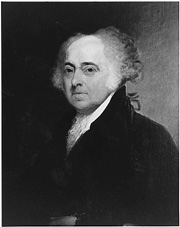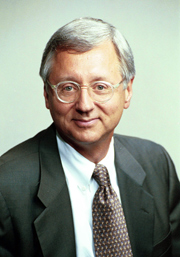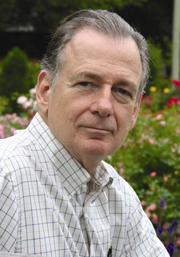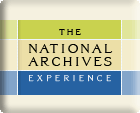October 2008
Washington, DC, Area Events
Program Highlights
- Treaty of Paris
In celebration of our new exhibit, “1783: Subject or Citizen?,” we present programs commemorating the 225th anniversary of the Treaty of Paris. (October 3, 18, 23) - William G. McGowan Forum on Communications, Technology, and Government
A panel of experts discusses “Technology, Elections, and Electronic Voting.” (October 17) - American Conversation with E. J. Dionne, David Brooks, and Douglas Brinkley
The Archivist welcomes four political commentators to discuss “New Loyalties for Old: A Farewell to the Two-Party System?” (October 14) - Partnerships in Innovation II: From Vision to Reality and Beyond
A conference addressing the challenges of preserving electronic records will be held in College Park, MD. (October 7-8) - Energy Independence
Jay Hakes discusses his book, A Declaration of Energy Independence. (October 21) - Book Lectures
Authors discuss The Assassin’s Accomplice: Mary Surratt and the Plot to Kill Abraham Lincoln; The Last Lincoln Conspirator: John Surratt’s Flight to Escape the Gallows; The Black Citizen-Soldiers of Kansas, 1864–1900; and Full Fathom Five: A Daughter’s Search (October 15, 16, 22) - Know Your Records Programs
A variety of programs explore records held by the National Archives. (September 30, October 1, 2, 7, 10, 14, 15, 21, 25, 28, 30)
Exhibit Highlights
- Permanent Exhibits
The Charters of Freedom, A New World Is at Hand, The Public Vaults, Magna Carta - Special Exhibit in Washington, DC
1783: Subject or Citizen? - Special Exhibit in College Park, MD
The Long View
Locations, Hours, and Contact Information
All events listed in the calendar are free unless noted; reservations are not required unless noted. Seating is on a first-come, first-served basis. Use the Special Events entrance on Constitution Avenue.
Treaty of Paris

Benjamin Franklin. Copy of painting by Joseph Duplessis, circa 1794-1802., 1935-1939
ARC Identifier 532834.

John Adams. Copy of painting, 1935-1939
ARC Identifier 532846.
This year marks the 225th anniversary of the 1783 Treaty of Paris, which ended the American Revolution and reshaped modern North America. In celebration of our new exhibit, “1783: Subject or Citizen?,” we present programs commemorating this historic event.
Friday, October 3, at 7 p.m.
William G. McGowan Theater
The Men Who Signed the Treaty of Paris
The legacy of the Treaty of Paris, signed on September 3, 1783, has been
much greater than was ever anticipated by its American and British negotiators.
A panel of historians will discuss the treaty signers: J. A. Leo Lemay,
professor, University of Delaware, and author of Benjamin Franklin:
A Documentary History; John P. Diggins, professor, City University
of New York, and author of John Adams; Walter Stahr, author of John
Jay; and William Anthony Hay, assistant professor, Mississippi State
University, on British signer David Hartley. Archivist of the United States
Allen Weinstein will moderate, and the Librarian and Archivist of Canada
Ian E. Wilson will make opening remarks. This program is presented in partnership
with the Embassy of Canada.
Saturday, October 18, at noon
William G. McGowan Theater
Treaty of Paris Film Series—1776
The musical 1776 shows the Second Continental Congress struggling
with the momentous question of whether to separate from Great Britain. John
Adams, with the help of Benjamin Franklin and Thomas Jefferson, is trying
to get the Congress to declare independence. This screening will be on 35mm
film. (1972, 142 minutes)

Thursday, October 23, at 7 p.m.
William G. McGowan Theater
A Salute to the National Film Board of Canada
This program, presented by the Academy of Motion Picture Arts and Sciences
in partnership with The Charles Guggenheim Center for the Documentary Film
and the Foundation for the National Archives, celebrates more than 50 years
of Oscar®-nominated and -winning short subjects produced by the National
Film Board of Canada (NFB). Hosted by renowned animation critic and historian
Charles Solomon, the program will feature several films, including Neighbours (1952), Christmas
Cracker (1962), Bob’s Birthday (1993), and Ryan (2004).
The program will be introduced by Academy President Sid Ganis. Joining us
from the NFB will be Government Film Commissioner Tom Perlmutter and animation
producer Marcy Page. Torill Kove, director of the 2006 Oscar®-winning
animated short subject The Danish Poet, will also appear.
McGowan Forum on Communications, Technology, and Government

Tom Mann
Friday, October 17, at 7 p.m.
William G. McGowan Theater
The Fourth Annual William G. McGowan Forum on Communications, Technology, and Government
Technology, Elections, and Electronic Voting
Ensuring that voting systems accurately record and report voter intent
has become a matter of great public concern since the 2000 confusion in
Florida. Much of the public debate has centered on the security of electronic
voting systems. Are these concerns valid? What are the advantages and disadvantages
of electronic voting systems? What can the U.S. learn from experiences
with new technologies around the globe? Brookings Senior Fellow Thomas
Mann moderates a panel including Tom Wilkey, executive director, Election
Assistance Commission; Roy Saltman, author, The History and Politics
of Voting Technology; Patrick Merloe, director, Electoral Programs,
Democratic Institute for International Affairs; Paul DeGregorio, former
commissioner, Election Assistance Commission; and David Beirne, director,
Election Technology Council.
American Conversation
Tuesday, October 14, at 7 p.m.
William G. McGowan Theater
New Loyalties for Old: A Farewell to the Two-Party System?
Archivist Allen Weinstein welcomes four political commentators
to discuss the impact of new technology, the expansion of voting groups, and
weakening party loyalty. Panelists include E. J. Dionne, Washington
Post columnist and senior fellow in governance studies, Brookings Institution; David
Brooks, New York Times columnist and commentator on The Newshour with Jim Lehrer; and Douglas Brinkley, professor, Rice University, and author of American Heritage History of the United States.
Read more about the American Conversations series.
Electronic Records Conference
Tuesday and Wednesday, October 7-8
College Park, MD
“Partnerships in Innovation II: From Vision to Reality and Beyond”
A joint conference sponsored by the University of Maryland at College Park and
the National Archives and Records Administration will address the challenges
of preserving electronic records. Read
more about the conference and register.
Energy Independence

Jay Hakes
Tuesday, October 21, at 7 p.m.
William G. McGowan Theater
A Declaration of Energy Independence
Between rising oil prices, global instability, and environmental degradation,
most Americans acknowledge the need for energy independence. As the former
head of the Energy Information Administration, Jay Hakes had an inside look
at America’s energy problems. Combining science with historical and political
context, Hakes offers his insight and presents viable solutions for a more
stable political, economic, and military future for America. Hakes is the director
of the Jimmy Carter Library in Atlanta. A book signing will follow the program.
Noontime Lecture Series
Book signings will follow each program.
Wednesday, October 15, at noon
Jefferson Room
The Assassin’s Accomplice: Mary Surratt and the Plot to Kill Abraham
Lincoln
Kate Clifford Larson tells the story of Mary Surratt, a little-known participant
in the plot to kill Abraham Lincoln, and the first woman ever to be executed
by the Federal Government. The Assassin’s Accomplice describes
the Lincoln conspiracy through the eyes of its only female participant by using
interviews, confessions, and court testimony.
Wednesday, October 15, at 1:30 p.m.
Jefferson Room
The Last Lincoln Conspirator: John Surratt’s Flight to Escape the
Gallows
Despite all that has been written about the assassination of Abraham Lincoln,
the story of John Surratt—the only conspirator who got away—remains
untold and largely unknown. Andrew Jampoler tells what happened to that last
conspirator.
Wednesday, October 22, at noon
Jefferson Room
Full Fathom Five: A Daughter’s Search
Mary L. Fowler discusses her book Full Fathom Five: A Daughter’s
Search. Born after her father was lost at sea in 1943, Fowler grew up not
knowing who he was or what happened to him and his submarine crew. After researching
ship’s logs, letters, and naval records, she wrote this memoir, which reveals
what she learned about the perils and hardships of submarine service in wartime,
the tragic irony of how her father’s sub was lost, and the long-term damage
experienced by the families of those who do not come home from war.
African American Military History
Thursday, October 16, 10:45 a.m.–noon
Washington Room
The Black Citizen-Soldiers of Kansas, 1864–1900
In The Black Citizen-Soldiers of Kansas, 1864–1900, Roger
Cunningham explores the quest of African American men, most of them former slaves,
for inclusion in American society in peacetime and wartime. He recounts the history
of black Regular Army soldiers and hundreds of other militiamen and volunteers
from the Sunflower State who provided military service from the Civil War until
the dawn of the 20th century. This program is presented by the Afro-American History
Society of the National Archives.
 Know Your Records Programs: October
Know Your Records Programs: October
Tuesday, September 30, at 11 a.m.
Room G-24, Research Center (Enter on Pennsylvania Avenue)
Declassifying Secrets: Opening Classified Records for Public Disclosure
Archivist Neil Carmichael will discuss the declassification process at the
National Archives. (This lecture will be repeated at the National Archives
at College Park, MD, in Lecture Room B, on Thursday, October 2, at 11 a.m.).
Wednesday, October 1, at 11 a.m., and Saturday, October 25, at 10 a.m.
Room G-24, Research Center (Enter on Pennsylvania Avenue)
Introduction to Genealogy
Archives staff will discuss basic genealogical research in Federal
records. These lectures occur on the first Wednesday of the month and on
selected Saturdays.
Tuesday, October 7, at 11 a.m.
Room G-24, Research Center (Enter on Pennsylvania Avenue)
The Federal Register and the Electoral College
Amy Bunk, the Federal Register’s director of legal affairs and policy,
will discuss the function of the Electoral College in Presidential elections
as well as the Federal Register’s everyday role. (This lecture will
be repeated at the National Archives at College Park, MD, in Lecture Room B,
on Friday, October 10, at 11 a.m.).
Tuesday, October 14, at 11 a.m.
Room G-24, Research Center (Enter on Pennsylvania Avenue)
“1783: Subject or Citizen?”—Treaty of Paris
Curator Lisa Royse will discuss “1783: Subject or Citizen?,” an
exhibit marking the 225th anniversary of the Treaty of Paris. (This lecture
will be repeated at the National Archives at College Park, MD, in Lecture Room
B, on Wednesday, October 15, 11 a.m.).
Tuesday, October 21, at 11 a.m. and noon
Room G-24, Research Center (Enter on Pennsylvania Avenue)
From the Records Book Group and Program
Following a related presentation at 11 a.m., the Book Group will discuss Spying
on the Bomb: American Nuclear Intelligence From Nazi Germany to Iran and
North Korea, by Jeffrey T. Richelson. Spying on the Bomb is
a history of the American-led effort to spy on every nation with nuclear
ambitions. Please check the Archives Shop (202-357-5271) for book availability
and a special discount for book group participants. NOTE: November’s
book will be The Lost Museum: The Nazi Conspiracy to Steal the World’s
Greatest Works of Art, by Hector Feliciano.
Saturday, October 25, noon–4 p.m.
Room G-24, Research Center (Enter on Pennsylvania Avenue)
“Help! I'm Stuck”
Not sure where to begin your research? Is there a problem that has stumped
you? Would you like to explore new directions in your research? One Saturday
a month, an archivist will be available from noon to 4 p.m. to answer questions.
Tuesday, October 28, at 11 a.m.
Room G-24, Research Center (Enter on Pennsylvania Avenue)
Access to Archival Databases (AAD) for Genealogists
Archivist Lynn Goodsell will introduce genealogists to electronic records in
the National Archives and show how to use them via the “Access to Archival
Databases” (AAD) online resource. (This lecture will be repeated at the
National Archives at College Park, MD, in Lecture Room B, on Thursday,
October 30, at 11 a.m.).
Boeing Learning Center
An exciting space designed to provide parents and educators of all levels with methods and materials for teaching with primary source documents. Open Monday–Saturday, 10 a.m.–4 p.m.
Exhibits
Rotunda for the Charters of Freedom:The Declaration of Independence, the Constitution, and the Bill of Rights are on permanent display in the Rotunda. "A New World Is at Hand" surrounds the Rotunda's centerpiece cases. Presenting a selection of milestone documents, the exhibit chronicles the creation of the Charters of Freedom in the 18th century and their impact on the course of history in the United States and around the world.
The Public Vaults: This interactive exhibit invites visitors into the stacks and vaults of the National Archives to explore the raw material from which history is made. From Washington's letters, Lincoln's telegrams, and FDR's fireside chats to UFO reports and declassified secrets of World War II, these documents chronicle both great national events and the lives of individual Americans.
Magna Carta: This foundation document of English common law was confirmed by Edward I in 1297. Only four originals of the 1297 Magna Carta remain, and only one permanently resides in the United States. Purchased by David M. Rubenstein in 2007, it is on loan to the National Archives. West Rotunda Gallery.
Special Exhibit in Washington, DC
1783: Subject or Citizen? The National Archives joins with Library and Archives Canada in this exhibit marking the 225th anniversary of the Treaty of Paris, which formally ended the American Revolutionary War. The rarely seen treaty, signed by John Adams, Benjamin Franklin, and John Jay, is a highlight of the exhibit. Lawrence F. O’Brien Gallery, October 3, 2008, through January 25, 2009.
A related exhibit, “Champlain's Dream,” with Samuel de Champlain’s notebooks and artifacts from the John Carter Brown Library, is at the Embassy of Canada Gallery, October 16–December 30. Champlain's Dream, a book by David Hackett Fischer, is to be published in October 2008 in the U.S. and Canada.
Special Exhibit in College Park, Maryland
Auditorium Lobby at the National Archives Research Center:
"The Long View" features digitally produced facsimiles of historic panoramic photographs from the Still Picture holdings.

Motorcycle Corps, Army Motor Service - Under Command of J. S. Berryman. US Capitol. Wash., DC. Jan. 26, 1919, By R. S. Clements. Records of the War Department General and Special Staffs (165-PP-60-47)
The exhibit not only showcases the wide variety of panoramic techniques, but also includes National Archives records such as cartographic maps and patent drawings that relate to the photographs. Thirty-four panoramas and other records are on display and span the period from 1864 to 1997.
See more panoramas online.
Traveling Exhibits
The traveling exhibit program makes it possible for people across the country to experience selected historical documents and artifacts that reflect our national experience.

Eyewitness: American Originals from the National Archives
Drawing on rarely displayed documents, audio recordings, and film footage culled
from the extensive holdings of the National Archives and its Presidential libraries,
"Eyewitness" features first-person accounts of watershed moments in
history.
Online exhibit
Tour itinerary:
October 4, 2008–January 4, 2009 |
Durham Western Heritage Museum, Omaha, NE |
Online Exhibits
Dozens of exhibits can be experienced online. Visit Now!
Locations, Hours, and Contact Information
The National Archives Experience
Constitution Avenue between 7th and 9th Streets, NW, Washington, DC
For details, see the Visitor's Map or visit the National Archives Experience.
- Daily, 10 a.m.–5:30 p.m.
- Last admission is 30 minutes prior to closing.
Open every day except Thanksgiving and December 25.
Admission free.
All events listed in the calendar are free unless noted; reservations are not required unless noted. Seating is on a first-come, first-served basis. Use the Special Events entrance on Constitution Avenue.
For details, see the Visitor's Map or visit the National Archives Experience.
For reservations or to be placed on the mailing list, call 202-357-5000 or e-mail public.program@nara.gov.
The National Archives Research Center
700 Pennsylvania Avenue, NW, Washington, DC and 8601 Adelphi Road, College Park, MD.
Research Hours for both locations:
- Monday, Tuesday, and Saturday, 9:00 a.m. - 5:00 p.m.
- Wednesday, Thursday, and Friday, 9:00 a.m. - 9:00 p.m.
Check the Washington, DC and College Park, MD location information for records pull times and other important details.
Call 202-357-5450 for a docent-led guided tour.
![]() TDD: 301-837-0482. The National Archives is fully accessible. To request an accommodation (such as a sign language interpreter) for a public program, please call 202-357-5000 or e-mail public.program@nara.gov at least two weeks prior to the event.
TDD: 301-837-0482. The National Archives is fully accessible. To request an accommodation (such as a sign language interpreter) for a public program, please call 202-357-5000 or e-mail public.program@nara.gov at least two weeks prior to the event.
PDF files require the free Adobe Reader.
More information on Adobe Acrobat PDF files is available on our Accessibility page.



